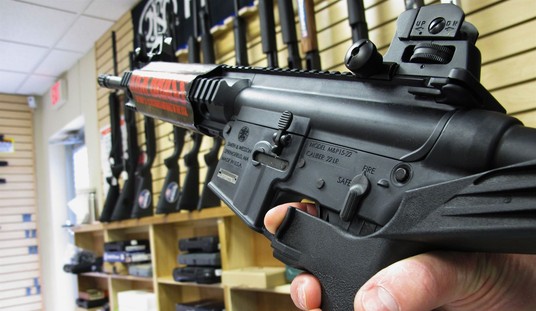There is no way gun stores can avoid the conflict between stores with bricks and stores with clicks.
“The internet is killing gun stores,” said a gun shop manager to me a few years back. His solution was to no longer do transfers for anyone. You either bought the gun from him or he would not do business with you. A seedy-looking lunch counter now occupies the building where that gun store used to be.
Did the internet kill the gun store? No, the store’s failure to adapt to changing market conditions killed the store. Gun transfers through local dealers is nothing new; it’s just increased in volume. Instead of using ads in the Shotgun News to find guns to buy, people can now search a vast number of gun stores and auction sites online to find the exact firearm they want.
I don’t claim to be an expert on running a gun shop. I’m a business owner, I’ve worked in retail, and I’ve even sold guns as part of an online business. I’m also consumer, and have been visiting gun shops as a buyer for more than a quarter century. I’ve got a few ideas that local gun shops might want to consider if they are having a tough time competing with e-commerce sites.
Transfers
Savvy business owners know that the cost of obtaining a new customer is much more expensive than retaining one you already have. Someone walking in and asking for assistance with a transfer is a buying customer. Turning them away means you have lost whatever advertising investment you made to bring them in, and you have virtually guaranteed they will not do business with you in the future.
Instead of turning away transfers, I suggest embracing them. Make transfers easy to do, and advertise that your store will happily do them. Provide a flyer to customers in the store and on your website that explain the steps they should take to make the transfer as smooth as possible.
Consider these reasons for handling gun transfers.
Capital Investment: A transfer does not require any investment of capital on the part of the store owner. This means none of the store’s money or credit is tied up in inventory sitting in a case. Is there anything worse than having a gun on your shelf that no one wants? You do not have that problem when handling transfers.
Accessory Sales: Not only is there a small profit to be made on each transfer, the has the potential of selling higher-margin accessories to the customer when he or she comes in to pick up the firearm. Having self-defense and practice ammo on hand for handgun shooters can turn a simple transfer into a sizeable profit. Likewise, you should have on hand cleaning kits, hunting ammo, and other items a new gun owner might need.
Relationship Building: If you are able to establish a relationship with your customer, he or she is more likely to return to you for his or her next purchase even if the item is a little cheaper somewhere else. Establishing that relationship with a transfer, especially when done in a very open and friendly way, will greatly increase the odds he or she will be back soon.
Service & Environment
Consumers are starved for good customer service. If you provide them a great experience, they will happily do business with you in the future and refer others to your store.
The problem of poor customer service is pervasive throughout the country. Does anyone look forward to getting in line at the driver’s license office or to calling the cable company? The friendly cashiers at Chick-fIl-A are almost shocking to anyone used to the typical fast food experience.
A poor customer service experience is far too typical for many consumers looking to buy a firearm. A new gun buyer is often apprehensive about entering a gun store for the first time. When he or she does, will a friendly staff and clean store meet them, or something more akin to a closed membership boys club?
Inviting Atmosphere: A gun store is not a bar: it should be well lit, have a fresh smell, and be very clean. A store that is dim and dank is not going to appeal to many buying customers. I shouldn’t have to say this, but wash the windows, sweep the floor and slap some paint on the walls if it has been a while.
Professional Sales Staff: The quality of your employees can make a huge difference in your sales. The staff should be knowledgeable on the kinds of guns and accessories that are being sold in the store. Your employees should also be smart enough to admit when they do not know something.
Employees should be well trained on the mechanics of the business such as running the cash register, placing special orders and completing the transfer paperwork.
Sloppy, rude or misogynistic staff are inexcusable, yet I’ve seen them far too often. Consider a trip I took with my ex-wife to a gun store near Atlanta. My ex- was a street cop and a hell of a shooter. Off duty she looked nothing like the cop she was on duty.
At the gun store, she asked the clerk if they had a specific belt slide holster for her SIG P220. Instead of answering the question, he began to tell her that she would be better served by getting a small gun to carry in her purse. When she politely asked her question again, the gun store employee continued to insist she did not want a .45, because that was too much gun for a petite woman.
That clerk cost the store a $100 sale that day, all of our future business and generated a lot of negative word-of-mouth advertising.
Decorations: Decorations should be tasteful and non-offensive. Women make up a sizeable portion of the buyers in today’s market. How many of them want to see posters of bikini-clad models hip firing a AK-47 when they come into a gun store?
Likewise, don’t assume that everyone who buys a gun has your same political views. A few of your potential customers may not like the targets featuring a presidential silhouette. You might think it is funny, but is it worth losing a sale and future business from the offended customer?
Bonus Tip – Reloading Supplies
Carrying reloading gear can be profitable for a gun shop. Hazmat shipping fees can inflate the cost of a pound of powder or 1,000 primers to unreasonable levels. For someone that buys in bulk, these costs are amortized across the quantity purchase, but many people don’t need, or even want, several eight pound kegs of Winchester 231.
A retailer who is buying in bulk is not severely impacted by the hazmat fee, and can offer customers those components at a price that is very competitive to online sales, but with the convenience of carrying it home immediately. In my experience, few gun stores carry a wide selection of reloading products. If it is the same in your area, you can build a sizeable business just on these products.
Most of the people who read my column do not sell guns professionally. But nearly everyone is a gun owner and has been into good and bad gun stores. What are the things that shops can do to earn your business? Where are the weak points that can be improved? Share your thoughts in the comment section below.








Join the conversation as a VIP Member